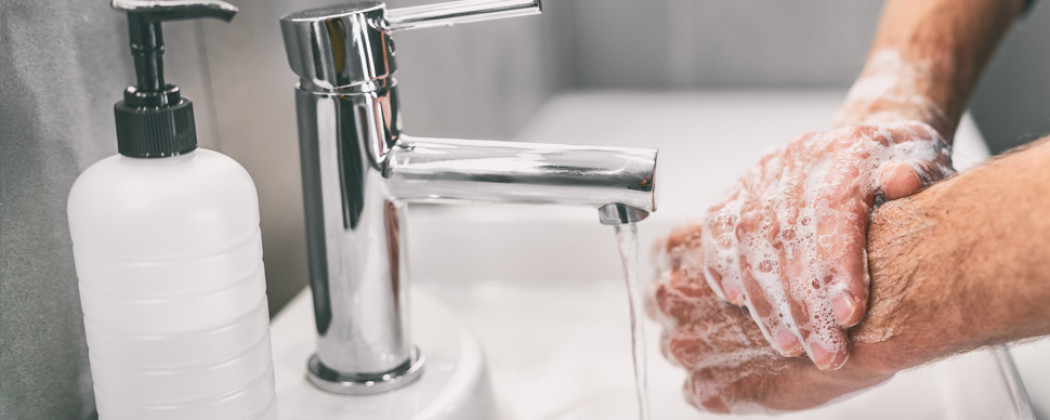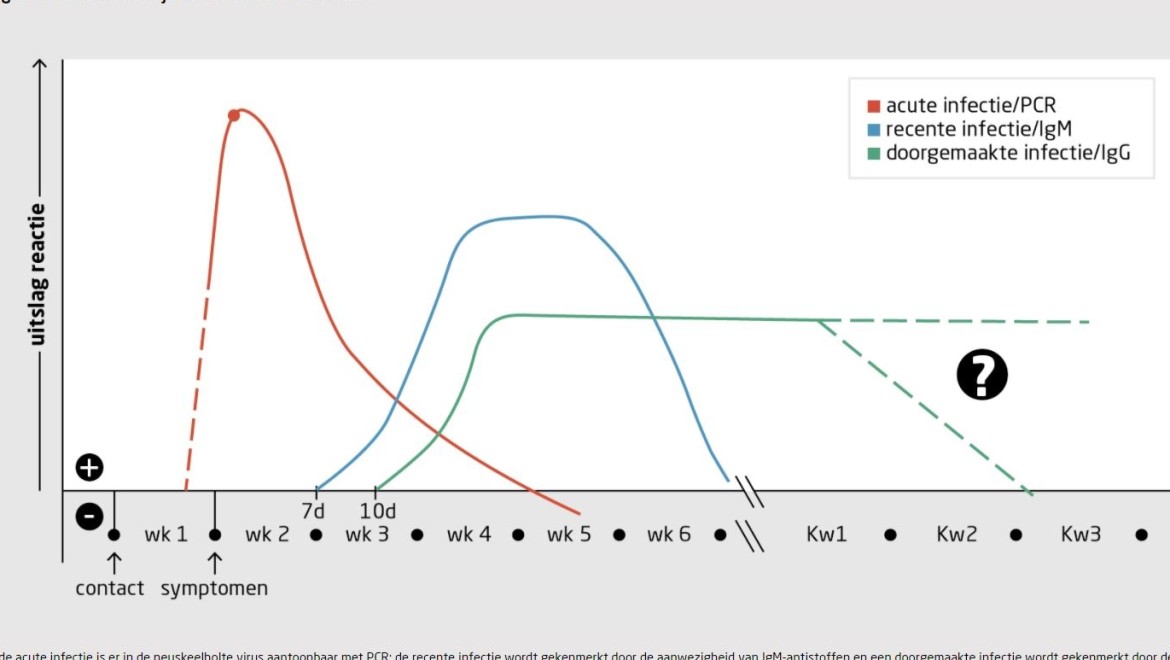For coronavirus testing, there are roughly 5 options available:
- The corona PCR test throat/nose swap
- This is used by a doctor to collect throat mucus with a cotton swab and send it to the laboratory to test if the virus is present in it.
- The corona PCR test gargle test
- Allows you to collect your own DNA by gargling with water for 10 seconds, spitting it into a tube and having it analyzed by the lab.
- The corona antigen test rapid test
- Here you can have a healthcare professional who has taken a nasal swab analyze whether you have corona within 15 minutes.
- The corona antibody test from blood (serum).
- This tests in your blood, which you have taken intravenously by a professional, at the lab to see if you have antibodies formed in your body against the virus.
- The corona rapid test with finger prick.
- This is used to check for the formation of antibodies by droplets of blood in a test that you have to perform yourself.
There are many coronaviruses but this disease is officially called SARS-CoV-2 or COVID-19. For convenience, we will call it coronavirus in this blog.

Do I have corona now? I'm contagious:
- The corona PCR test throat/nose swap is done by the RIVM and the GGD, problem is that a shortage of collection material lurks.
- collection by health care professional, analysis in the laboratory
- The corona PCR test gargle test you can do yourself, it does not require material that can run out quickly, a tube and water is sufficient to collect as much dna as with the nose/throat swap.
- easy to collect yourself, analysis in the laboratory
- The corona antigen test rapid test
- Soon many inexpensive tests available, no lab required, but collection by health care professional. If the result is positive it is almost certainly corona, if the result is
- If the result is negative, in 3% of the cases you can still have corona.
I had corona. Am I immune?
4. The corona antibody test from blood (serum).
- This is used to test your blood, which is taken intravenously by a professional, to see if you have antibodies in your body against the virus.
5. the corona rapid test with finger prick.
- With this test, drops of blood are used to see whether antibodies are formed in a test that you have to perform yourself.
An acute infection, at the stage when you are contagious you measure with a
- PCR throat/nose test,
- PCR gargle test or
- Antigen rapid test by nasal swab.
These tests can be positive just a few days before you experience symptoms.
7 to 10 days after the first symptoms, the IgM antibodies rise to the surface.
After three weeks the seroconversion from IgM to IgG antibodies takes place. If this goes well and you have IgG antibodies, they will stay on for a long time and offer protection.
These antibodies are also given to sick patients via plasma donors so that they can recover sooner.
How does the coronal test used by the RIVM work?
A PCR test shows whether the virus is actually found in the body. A PCR test can therefore provide information about an infection even before your body reacts to the virus by producing antibodies.
In the PCR apparatus copies are made of a specific piece of genetic material. For copying, a special protein is needed that is put into the PCR machine together with the sample of throat mucus. If the virus is present in the cells of the throat mucus, a chain reaction is set in motion. If enough copies are made, the virus can be detected. The researcher also sees if someone is not infected with the virus; in that case no copies are made.
Although the PCR-RNA technique is very reliable, it can happen that the result is negative, so that the virus is not shown, while you have or have had the coronavirus. Usually this is because the throat or nose sample was not taken properly. For example, if you are too early or too late with the sample. A throat does not continue to give off the virus for days.
It is possible that the virus is no longer detectable in the throat after 1 or 2 weeks after the first symptoms of illness. Then, lung X-rays have to be taken, on which the virus is typical and recognizable for the specialists. Technically, it is also possible to show the virus in the faeces, but the laboratories are not equipped for that yet.
However, a gargle test is now possible. It is no longer necessary to make a painful smear of the nose and throat and you can do it yourself.
Blood value test only performs the gargle test not the PCR test via nose-throat swap.
The tests have been completed and the comparison between the test taken with gargling and nose-throat swap match. We are therefore currently waiting for approval of this test by the RIVM.
For up-to-date information, go to the National Coordination of Infectious Disease Control, part of RIVM D
How does the Coronatest used by the blood bank work?
The test that the Sanquin blood bank does, from the blood that they have already collected from 10,000 donors, is a test to see if antibodies have formed in the blood.
When a virus enters your body, it goes on the attack, these substances we can measure.
First the IgM antibodies are formed, then you can know if there is a recent infection. After that the IgG antibodies are formed, which indicate that the disease was experienced longer ago.
What is an ELISA test for measuring antibodies to corona measured by the laboratory?
ELISA is laboratory test for measuring blood samples. The name is an abbreviation of Enzyme-Linked Immuno Sorbent Assay. Another term for ELISA is Enzyme Immuno Assay (EIA). It looks for a binding between antigen and antibody. By demonstrating this in blood, serum or other body fluids, it is possible to contribute to the diagnosis of an infectious disease (or an autoimmune disease).
There are different types of antibodies;
- COVID-19 IgG antibodies
- COVID-19 IgM antibodies, these are not recommended because of the high rate of cross-reaction with other similar viruses.
- COVID-19 Viral AntigenIgA Antibodies
Here you see how the antibodies developed for the SARS-Cov-2 virus. How long the IgG antibodies stay present is not clear yet, because the disease has not existed for that long. There are people who still have antibodies and people whose antibodies have already disappeared. It is likely that you have little chance of getting the disease again and it will probably be less severe if you get it a second time. Not only the antibodies present seem to have a predictive value for immunity, also the T memory cells seem to play a role in preventing someone from getting Covid-19 again after a previous disease.
IgM antibody cross-reacts with other viruses
From experience with other coronaviruses we know that IgM antibodies are mainly directed against the N protein of the virus. Because the N-protein is very similar to other human coronaviruses (90% similarity) the IgM antibody possibly shows a krDaarom some ELISA suppliers have chosen to measure IgA antibodies to the S1 protein for SARS-CoV-2.
If you test positive, you can't get corona?
Our immune system cannot distinguish between these substances and reacts in the same way. It seems that you have antibodies against the new COVID-19 Corona, but in reality this is against another coronavirus that you have previously contracted.
If the results of this test are positive, you have produced antibodies against corona.
If you have been tested positive, i.e. if the antibodies are shown to indicate that you have had corona, it is not at all certain that you cannot get the disease again. At this moment research is being done.
It seems that rhesus monkeys, which have antibodies in their blood, cannot become ill again, but how this works in humans and whether we can actually build group immunity, still needs a lot of research.
SO STICK TO THE GOVERNMENT GUIDELINES.
Further studies need to be conducted to see if SARS-CoV nucleocapsid protein antibody positivity has any predictive significance on not getting the diseases again or not being infectious over time.
Fortunately, the new coronavirus is characterized by the rapid production of antibodies. With many infectious diseases it takes longer, but with COVID-19 it seems that after the tenth day after showing characteristics of the infection, everyone has produced antibodies. I myself have the theory that it is possible that in some people who become seriously ill, the virus has been able to settle directly in the lungs, so that the body has not had enough time to produce antibodies.
See here which tests Blood Value Test offers for this: How many corona antibodies, have I had covid-19?
How does a corona rapid test work I've had corona can be bought from a drugstore, but with a few drops of blood taken with a finger prick instead of urine.
A quick test actually works just like a pregnancy test, which you can take yourself at the
- If there is no line on the control line, the test has failed.
- If there is only a control line and nothing else, the test is negative, which means that you have not made any antibodies against Corona.
- If either the igM or the igG dash shows, or both, then you are positive and have Corona, or have had it.

What is a false positive test?
If the results show that you have antibodies against corona, but in reality you have no antibodies against corona.
What is a false negative test?
If the test shows that you are not infected with corona, but in reality you are or have been.
You're home sick and you want to know if you have corona?
Coronate tests that indicate a current infection are currently only for the severely ill, whose caregivers need to know if they have the coronavirus for their treatment. Ordinary citizens with milder symptoms are therefore not eligible. It is not the time to do a test out of curiosity. The system is already heavily burdened. By the way, the chances of having corona are slim because it's also flu and cold season.
Can I order a quick test to see if I have had Corona and made antibodies?
No, these tests are not yet released because there are still too many false positive results. A false positive result means that the test indicates that you have antibodies, but these appear to be for another virus and not for COVID-19.
These tests are not supplied by Blood Values Test, because they are not reliable enough at this moment.
Can I take the test anonymously?
No, Covid-19 PCR test that detects virus is notifiable.
https://www.bloodtesting.nl/service/meldingsplichtige-infectieziekten/



MORE INFECTIONS, A SECOND WAVE, SO WHAT? - Corona Sobriety
at 03 Aug 2020Gerard Heida
at Sep 26, 2020Ton van Steenderen
at 24 Oct 2020Ellen van Gijsel
at 27 Oct 2020Ton van Steenderen
at 26 Oct 2020Ellen van Gijsel
at 27 Oct 2020Toos Pike
Retrieved from Dec 07, 2020